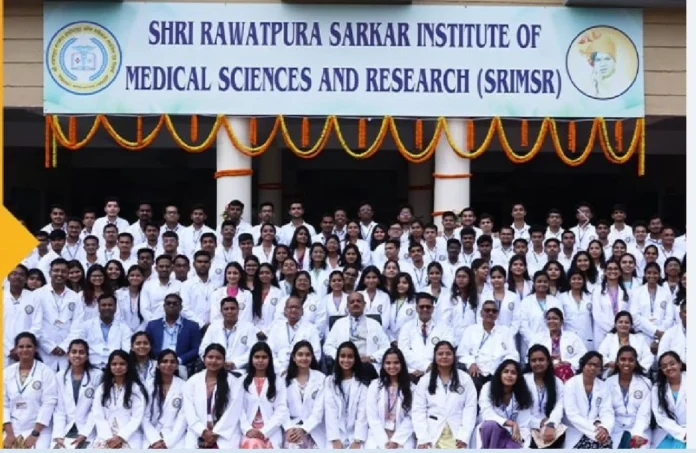By Neeraj Mishra
Early morning on a rain-fed Friday last week, a Central Bureau of Investigation (CBI) team descended on the Shri Rawatpura Sarkar Institute of Medical Sciences and Research (SRIMSR), located on the outskirts of Naya Raipur in Chhattisgarh. Unlike the usual orchestrated welcomes at the spiritual empire of the turbaned Shri Ravi Shankar Maharaj—better known as Rawatpura Sarkar—there was only stunned silence.
Within hours, the CBI had arrested six individuals, including three doctors, caught red-handed while accepting a Rs 55 lakh bribe in exchange for a favourable inspection report to help the college qualify as a recognised medical institution.
But as the day progressed, it became clear this was merely the tip of the iceberg. Raids were simultaneously underway at over 40 locations across Madhya Pradesh, Rajasthan and Andhra Pradesh. By evening, the agency had begun calling it the biggest medical scam in India’s history.
When the First Information Report (FIR) surfaced, it sent further shockwaves through bureaucratic and academic circles. Named in the FIR were none other than Rawatpura Sarkar himself (chairman of the medical college under his trust), and Chhattisgarh Real Estate Regulatory Authority (RERA) Chairman Dr Sanjay Shukla. A controversial figure, Shukla is a forest service official who served his entire career on deputation as an IAS officer, owing to his close proximity to former chief secretary Vivek Dhand.
Dhand, who made way for Shukla as RERA chairman in 2022, had earlier appointed him as the principal chief conservator of forests. Shukla, who remains unflustered in his current role, is also a trustee of the SRIMSR—the medical college now at the centre of the storm.
Other prominent names mentioned in the FIR include former University Grants Commission Chairman and current Tata Institute of Social Sciences Chancellor DP Singh, as well as Indore-based medical college baron Suresh Singh Bhadoria of Index Medical College.
THE SCAM UNVEILED
Dummy faculty, fake inspections, doctored patient records, and leaked confidential files—these were the cornerstones of a nationwide network of fraud that had become institutionalised over time. It was an open secret in medical circles, though few dared to confront it. Bribes, often routed through hawala and banking channels, reached officials in the National Medical Commission (NMC) and the Union ministry of health, ensuring smooth inspection reports and glowing accreditation for even the most dubious of institutions.
NMC insiders allegedly revealed confidential schedules and internal documents in exchange for hefty payouts. And the main orchestrator, according to the CBI, was Indore’s Bhadoria, whose network could conjure ghost faculty, forged attendance sheets, and counterfeit experience certificates on demand.
THE NEXUS AND ITS ENABLERS
Bhadoria’s operations were reportedly shielded by the patronage of Rawatpura Sarkar. Colleges across the country paid between Rs three to five crore crore for guaranteed NMC approvals—payments often verified via WhatsApp before clients were added to privileged groups where inspections were “managed”.
Agents based in Andhra Pradesh, Telangana, and other southern states were crucial to the logistics. They arranged everything from dummy patients to faculty during NMC inspections. One institution, Father Colombo Institute of Medical Sciences in Warangal, is reported to have paid over Rs four crore for clearances, routed via legitimate banking channels to mask illegality.
Photos of regulatory documents were allegedly sent directly from New Delhi to college managements via WhatsApp. Among the recipients were Virendra Kumar from Gurgaon, Manisha Joshi from Dwarka, and the Registrar of Udaipur’s Geetanjali University, Mayur Raval.
Jitu Lal Meena, a former Medical Assessment and Rating Board (MARB) member, has emerged as a key facilitator—allegedly brokering bribes and leaking documents. Shockingly, some of the funds Meena collected were used to build a temple in Jaipur, the CBI claims.
From Kadiri in Andhra Pradesh, B Hari Prasad and his associates Ankam Rambabu (Hyderabad) and Krishna Kishore (Visakhapatnam) acted as on-ground operatives. Kishore alone collected Rs 50 lakh from the Director of Gayatri Medical College for a fixed inspection.
THE ROOT OF IT ALL
At the heart of the scam lie two men: Rawatpura Sarkar and Suresh Bhadoria—both hailing from Lahar in Madhya Pradesh’s Bhind district.
Ravishankar began as a rustic soothsayer in Rawatpura, known for its Hanuman Temple. Much like today’s Dhirendra Shastri, he rose to prominence through connections with powerful politicians in Gwalior and Raipur. What began as local darbars morphed into an expanding religious empire, with operations in Bhopal and Raipur.
His success lay not just in spiritual theatrics, but in administrative acumen. He embedded IAS and IPS officers into his trust—one IGP named Mathur reportedly prostrated before him in public. These theatrics drew more bureaucratic devotion, deepening his reach.
Dr Sanjay Shukla joined the trust later, but brought considerable clout from Raipur’s power corridors. Now named in the FIR, along with 34 others, Shukla has yet to face arrest.
CONTROVERSIAL PAST
This isn’t the first time Rawatpura Sarkar has drawn scrutiny. His trust, now headquartered in Raipur, has faced multiple allegations: illegal land encroachments, unapproved educational institutions, coerced religious participation, and even mental harassment of women within his ashrams. Though these cases were probed by human rights commissions, no action followed.
Now, with the godman himself named in a CBI FIR, his followers are stunned. Accustomed to divine reverence, the idea of their guru attending court hearings as an “ordinary mortal” has sparked protests. They demand his name be struck off the FIR to spare him the indignity of legal accountability.


